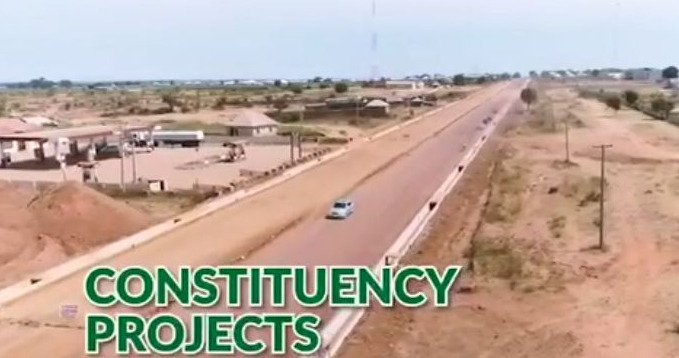Execution And Tracking Of Constituency Projects In Nigeria: Matters Arising

Simply put, Zonal Intervention Projects (ZIPs), also known as Constituency Projects (CPs), are projects that are conceptualised and executed on behalf of legislators in their respective constituencies by contractors. They are capital-intensive projects that are executed across Nigeria supposedly under the watch of the members of the two houses of the National Assembly.
The idea and execution of CPs could be viewed as proof of government’s positive dispositions towards grassroots people. They are ideally meant to spread development to all the nooks and crannies of the country, through the intervention of the people’s elected representatives in the National Assembly, who, ideally should be in tune with their needs.
In Nigeria, however, the constituents, whose needs CPs are meant to assuage, have been unfortunately denied the benefits of these projects due to the fact that over the years most of their representatives have thoroughly abused the initiative, turning it into an avenue for uncensored sleaze. The brazen breaches of public trust by these elected representatives have been one of the sore points of the return of democratic governance since 1999.
In most constituencies across the country, constituents have been brainwashed by their representatives into seeing CPs as being personally funded by them, contrary to the fact that constituency and other projects are actually funded by the government with public funds; the projects are not gifts or charity donations by political representatives to their constituencies, but dividends of national economic activities and expressions of government’s fiduciary responsibilities to the people. The truth is that, over the years, Nigerians in rural communities have simply had little or no ideas about government projects in their communities.
Sometime ago, President Muhammadu Buhari, while speaking at the “National Summit on Diminishing Corruption in Public Sector”, which was put together by the Independent Corrupt Practices and other related offences Commission, ICPC, in collaboration with the Office of the Secretary to the Government of the Federation, lamented that there was little to show for over N1t budgeted for CPs from the National Assembly members in the last decade.
The reality in Nigeria today is that some agencies of government are favourites for the implementation of CPs irrespective of their actual responsibilities and capacity to deliver or supervise projects. Most notorious in this regard are the Border Communities Development Agency, and Small and Medium Enterprises Development Agency of Nigeria.
Duplication of contracts with identical descriptions, accounts, amounts, locations awarded by the same MDA to bring the amounts allocated within approval threshold of the executing agency, or to expend allocations to sponsors of the constituency projects, are commonplace, with many of these contracts inflated and yet poorly executed. Substandard items are used against specifications in the Bill of Engineering Measurements and Evaluation thus diminishing the value of the projects to the intended beneficiaries. Many projects are also not constructed to specifications.
Again, despite the popularity of empowerment and capacity building projects, they are seriously prone to abuse and very difficult to monitor. Approximately 50 percent of budgetary allocations to zonal intervention projects go to these opaque activities. Empowerment items are sometimes hoarded by sponsors and not distributed till the next budget cycle, while in some cases the same items are re-budgeted and duplicated.
It has also become customary for lawmakers to refrain from reaching out to their immediate constituents for needs assessment, the reason why over 50 percent of projects nominated by them to the respective agencies are mainly empowerments programmes, which provisions are short-term and meet only the individual’s immediate needs but without any long-term impact on the community.
These and other alleged criminal activities involving the lawmakers were contained in a recent report by the Constituency Projects Tracking Group (CPTG), a task force of the ICPC. The report pointedly accused some lawmakers of conniving with agencies to embezzle billions of naira meant for constituency projects. So, which way Nigeria?
The fundamental purpose of CPs is to ensure that rural communities feel the impact of the Federal Government. To achieve this noble goal, an effective system for tracking CPs must be put in place to achieve inclusive growth for the country. The Federal Government must enforce an effective budget monitoring and evaluation body to track project progress and standardise verification.
Again, representatives should engage their constituents in the budget-making process to ensure their priority needs are well-captured in every annual fiscal plan. Project locations should be included in the budget, for easy access by citizens and organisations.
The government could also adopt an independent reporting mechanism for capital projects ultimately to monitor their progress and ensure judicious use of public funds in creating value for the people. This must be prioritised to ensure public participation in contract award with details of all contracts (contractor’s name, government budget benchmark, terms of the agreement, bill of quantity, etc) available in the public domain. The government can control incompetence and contract fraud through this initiative via the provision of updated contact information.
Again, elected representatives must be engaged and request for the status of public projects in the community made of them. Community/town hall meetings should be organised by residents to find out the status of projects with residents in the community. Visits should be made to project sites to follow up with execution, and findings should be reported to relevant agencies, such as the anti-corruption units, for necessary actions to be taken.
The truth is that the level of citizen participation in the democratic process and governance in Nigeria is deplorable. Most Nigerians have surrendered to fate. People are reluctant to engage the system and hold their elected and appointed representatives accountable. Part of the problem is that people do not have confidence in anti-graft institutions. There is a strong perception that petition writing hardly results in diligent investigations.
Nigerians should change their attitude towards holding their elected representatives accountable. The practice of playing the proverbial ostrich in the face of glaringly misdemeanors by their representatives must stop.
In all, proper monitoring of the execution of CPs by our various representatives would go a long way in reducing poverty, unemployment among others in Nigeria.
God bless Nigeria!
Jude Obuseh is a Nigeria based Peace Researcher and Practitioner, Journalist, Scholar, Publisher, Life Coach and Entrepreneur. E-mail at syncado2006@gmail.com

Justin Nwosu is the founder and publisher of Flavision. His core interest is in writing unbiased news about Nigeria in particular and Africa in general. He’s a strong adherent of investigative journalism, with a bent on exposing corruption, abuse of power and societal ills.













